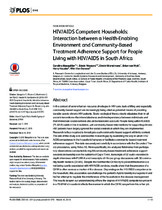| dc.contributor.author | Masquillier, Caroline | |
| dc.contributor.author | Wouters, Edwin | |
| dc.contributor.author | Mortelmans, Dimitri | |
| dc.contributor.author | van Wyk, Brian Eduard | |
| dc.contributor.author | Hausler, Harry | |
| dc.contributor.author | Van Damme, Wim | |
| dc.date.accessioned | 2016-03-15T20:55:22Z | |
| dc.date.available | 2016-03-15T20:55:22Z | |
| dc.date.issued | 2016 | |
| dc.identifier.citation | van Wyk, B. et al. (2016). HIV/AIDS competent households: Interaction between a health-enabling environment and community-based treatment adherence support for people living with HIV/AIDS in South Africa. PLoS One, March: 1-19 | en_US |
| dc.identifier.issn | 1932-6203 | |
| dc.identifier.uri | http://hdl.handle.net/10566/2089 | |
| dc.description.abstract | In the context of severe human resource shortages in HIV care, task-shifting and especially
community-based support are increasingly being cited as potential means of providing
durable care to chronic HIV patients. Socio-ecological theory clearly stipulates that–in all
social interventions–the interrelatedness and interdependency between individuals and
their immediate social contexts should be taken into account. People living with HIV/AIDS
(PLWHA) seldom live in isolation, yet community-based interventions for supporting chronic
HIV patients have largely ignored the social contexts in which they are implemented.
Research is thus required to investigate such community-based support within its context.
The aim of this study is to address this research gap by examining the way in which HIV/
AIDS competence in the household hampers or facilitates community-based treatment
adherence support. The data was analyzed carefully in accordance with the Grounded Theory
procedures, using Nvivo 10. More specifically, we analyzed field notes from participatory
observations conducted during 48 community-based treatment adherence support
sessions in townships on the outskirts of Cape Town, transcripts of 32 audio-recorded indepth
interviews with PLWHA and transcripts of 4 focus group discussions with 36 community
health workers (CHWs). Despite the fact that the CHWs try to present themselves as
not being openly associated with HIV/AIDS services, results show that the presence of a
CHW is often seen as a marker of the disease. Depending on the HIV/AIDS competence in
the household, this association can challenge the patient’s hybrid identity management and
his/her attempt to regulate the interference of the household in the disease management.
The results deepen our understanding of how the degree of HIV/AIDS competence present
in a PLWHA’s household affects the manner in which the CHW can perform his or her job and the associated benefits for the patient and his/her household members. In this respect,
a household with a high level of HIV/AIDS competence will be more receptive to treatment
adherence support, as the patient is more likely to allow interaction between the CHW and
the household. In contrast, in a household which exhibits limited characteristics of HIV/
AIDS competence, interaction with the treatment adherence supporter may be difficult in
the beginning. In such a situation, visits from the CHW threaten the hybrid identity management.
If the CHWhandles this situation cautiously and the patient–acting as a gate keeper–
allows interaction, the CHW may be able to help the household develop towards HIV/AIDS
competence. This would have a more added value compared to a household which was
more HIV/AIDS competent from the outset. This study indicates that pre-existing dynamics
in a patient’s social environment, such as the HIV/AIDS competence of the household,
should be taken into account when designing community-based treatment adherence programs
in order to provide long-term quality care, treatment and support in the context of
human resource shortages. | en_US |
| dc.language.iso | en | en_US |
| dc.publisher | Public Library of Science | en_US |
| dc.rights | Copyright: © 2016 Masquillier et al. This is an open
access article distributed under the terms of the
Creative Commons Attribution License, which permits
unrestricted use, distribution, and reproduction in any
medium, provided the original author and source are
credited. | |
| dc.source.uri | http://dx.doi.org/10.1371/journal.pone.0151379 | |
| dc.subject | HIV/AIDS | en_US |
| dc.subject | Community-based support | en_US |
| dc.subject | People living with HIV/AIDS (PLWHA) | en_US |
| dc.subject | Community health workers (CHWs) | en_US |
| dc.title | HIV/AIDS competent households: Interaction between a health-enabling environment and community-based treatment adherence support for people living with HIV/AIDS in South Africa | en_US |
| dc.type | Article | en_US |
| dc.privacy.showsubmitter | false | |
| dc.status.ispeerreviewed | true | |
| dc.description.accreditation | Web of Science | en_US |

